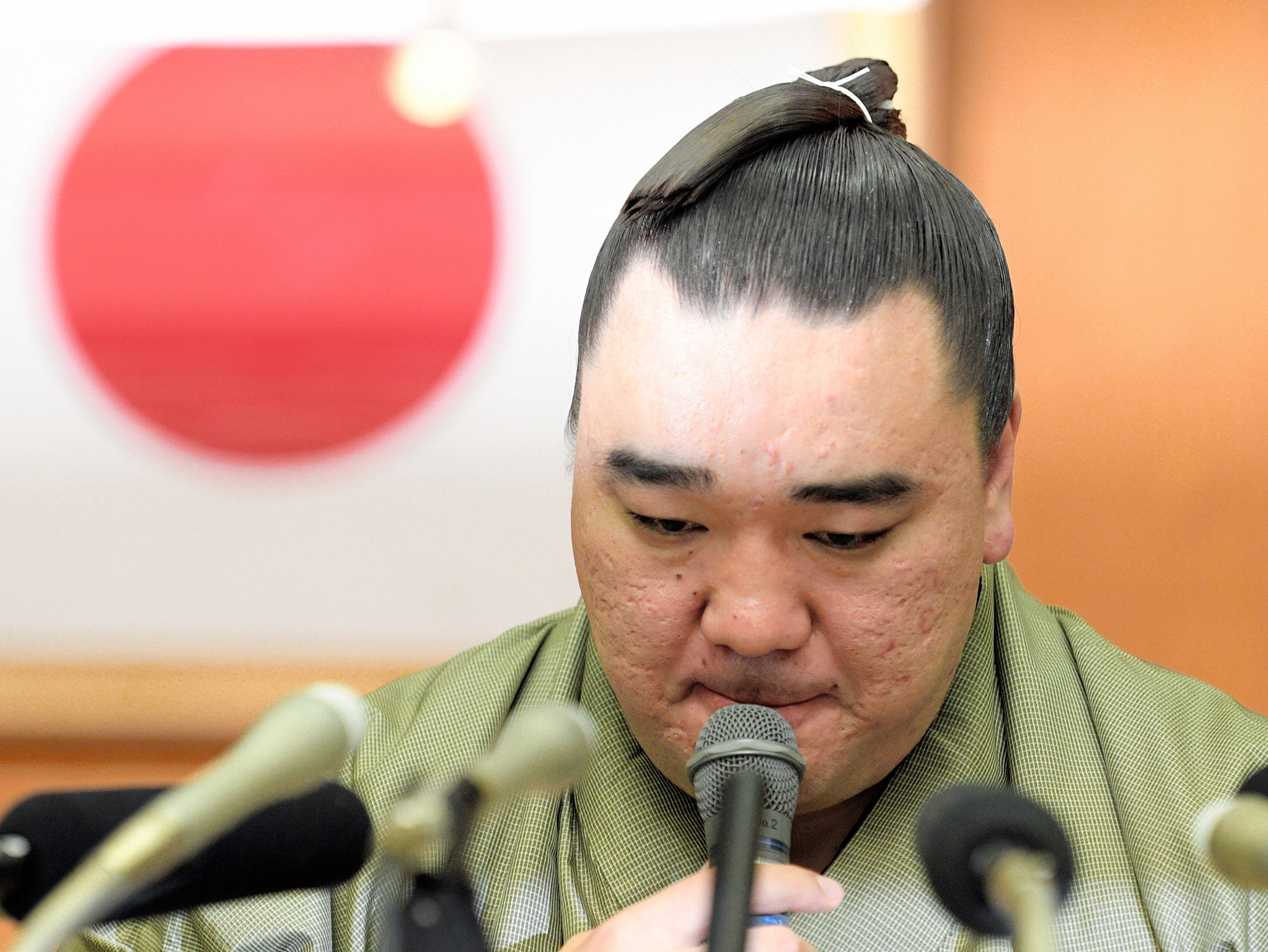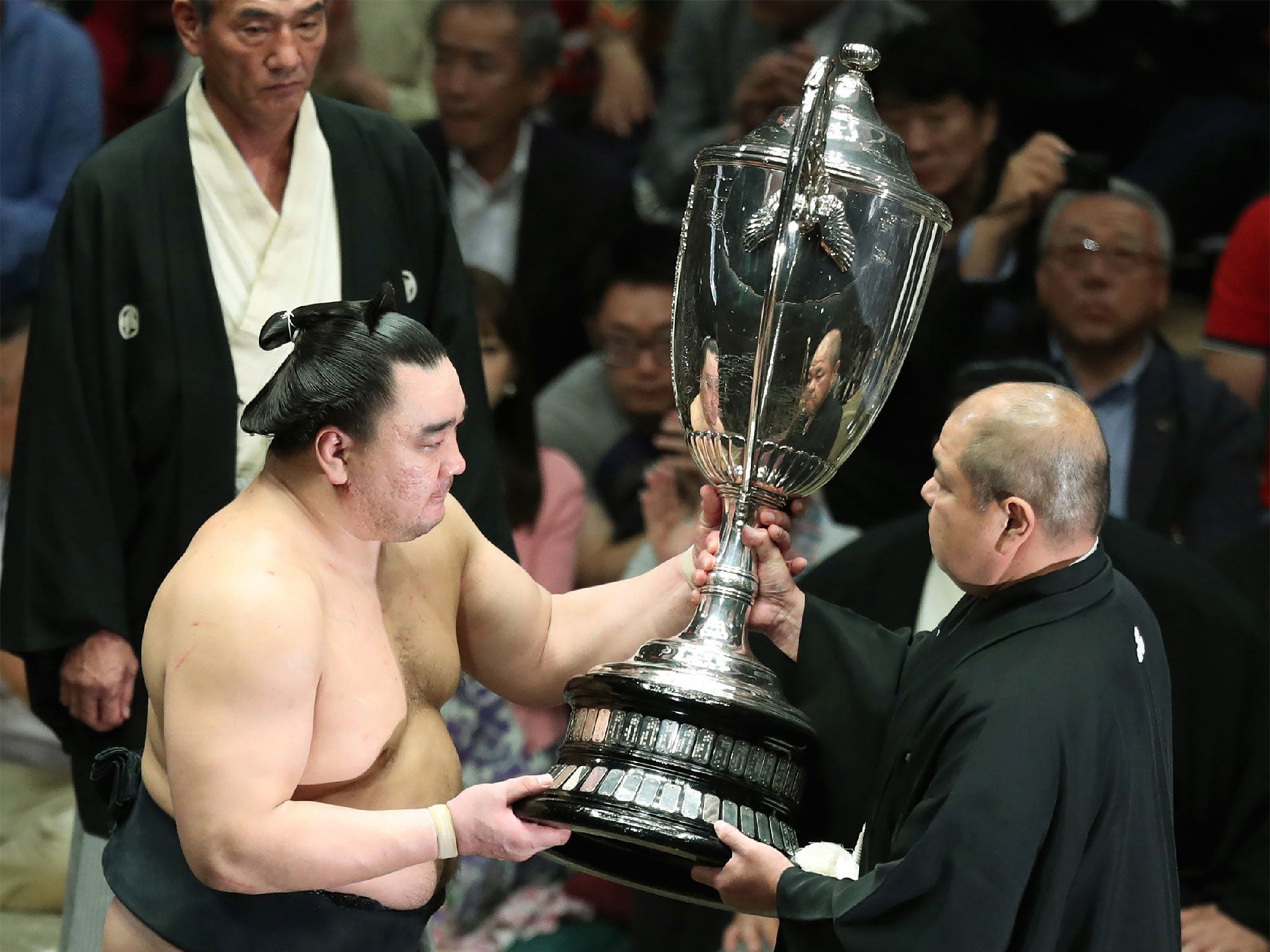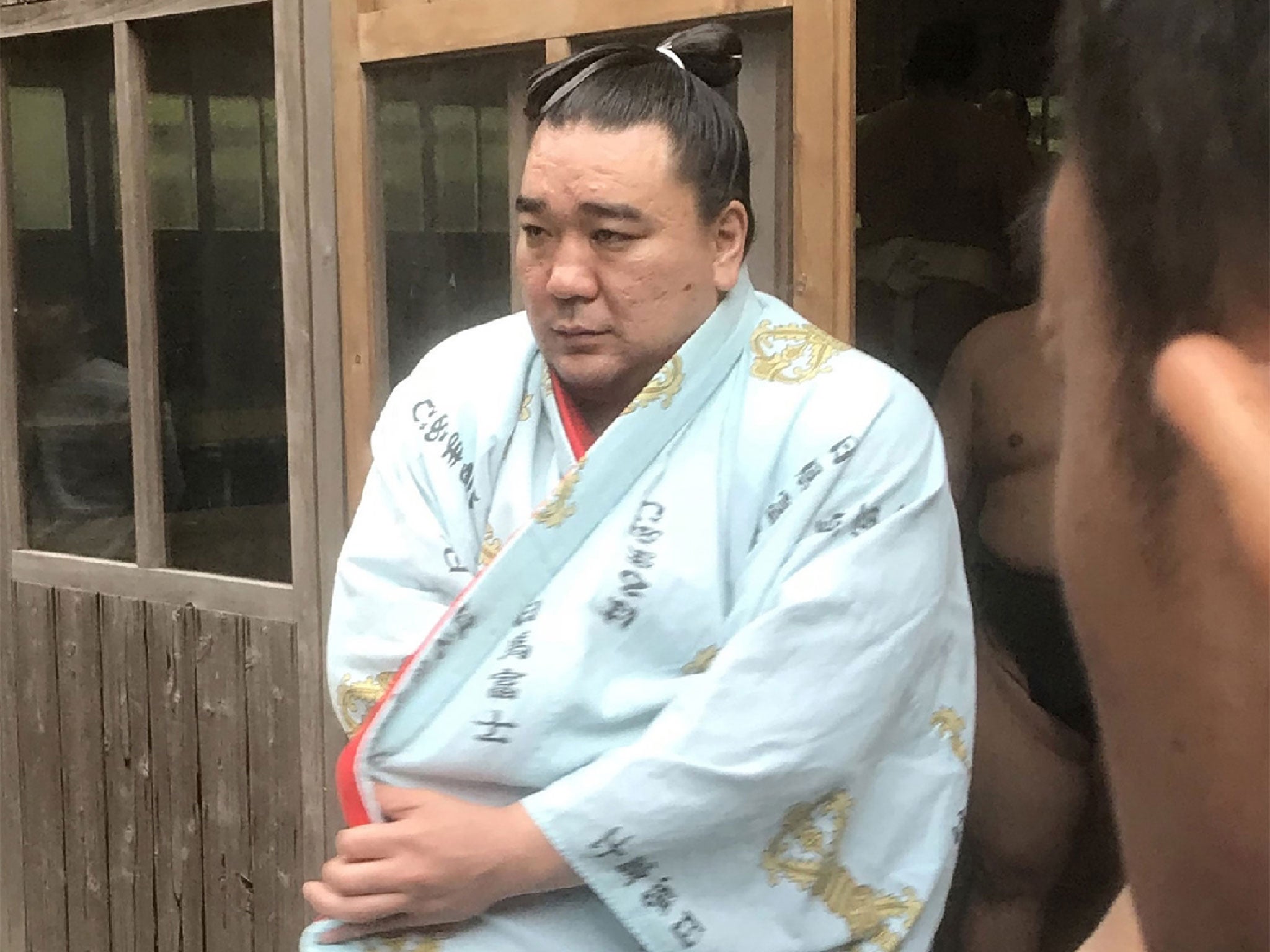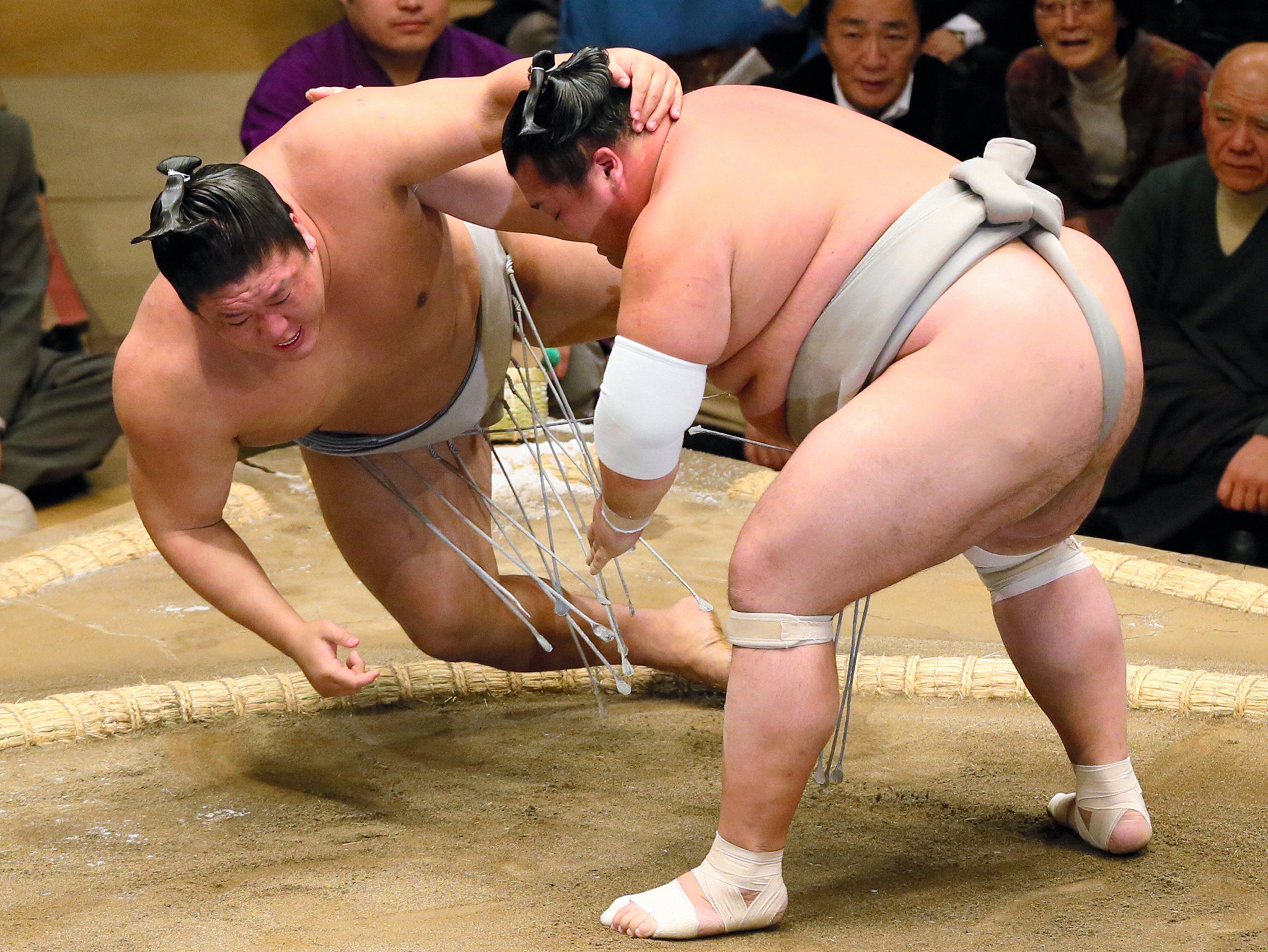Sumo grand champion Harumafuji announces his retirement over serious assault incident in Japan
Harumafuji, a Mongolian wrestler has won nine grand tournaments, was reported to have attacked a junior wrestler in bar

Your support helps us to tell the story
From reproductive rights to climate change to Big Tech, The Independent is on the ground when the story is developing. Whether it's investigating the financials of Elon Musk's pro-Trump PAC or producing our latest documentary, 'The A Word', which shines a light on the American women fighting for reproductive rights, we know how important it is to parse out the facts from the messaging.
At such a critical moment in US history, we need reporters on the ground. Your donation allows us to keep sending journalists to speak to both sides of the story.
The Independent is trusted by Americans across the entire political spectrum. And unlike many other quality news outlets, we choose not to lock Americans out of our reporting and analysis with paywalls. We believe quality journalism should be available to everyone, paid for by those who can afford it.
Your support makes all the difference.Sumo grand champion Harumafuji announced he would retire on Wednesday to take responsibility for injuring a junior wrestler in an incident that has threatened to taint the image of Japan's national sport just as it was regaining popularity.
The 33-year-old Mongolian-born "yokozuna" (grand champion) had already apologised earlier this month after media reported he had beaten junior wrestler Takanoiwa while drinking at a restaurant-bar with other wrestlers.
"As yokozuka I feel responsible for injuring Takanoiwa and so will retire from today," a stern-faced Harumafuji told a news conference carried live by several Japanese broadcasters in Fukuoka, southern Japan, site of the most recent tournament.
"I apologise from my heart to the people, sumo fans, the Japan Sumo Association, to supporters of my 'stable' (gym) and my 'oyakata' (coach) and his wife for causing such trouble."
Harumafuji gave no details of the incident -- still under investigation by police -- which media reports said occurred when he got angry because the younger wrestler was checking his smartphone after being chastised for a bad attitude.
Takanoiwa, 27, did not take part in the latest tournament due to his injuries, which the sumo association said included a fractured skull and concussion.
"I think it is my duty as a senior wrestler to correct and teach junior wrestlers when they are lacking in manners and civility," Harumafuji said. "But I went too far," he said, adding that the commotion was not alcohol-fuelled.

The incident has highlighted sumo's struggle to reform harsh conditions that can breed violence in its closed, hierarchical world, although some wrestlers say there have been improvements in the decade since a trainee was beaten to death.
"Sumo, recognising its responsibility as the sport with the longest history in Japan, must stamp out violence so that the expectations of the people, including youth, are not again betrayed," Education Minister Yoshimasa Hayashi, whose ministry oversees sports, said in a parliamentary committee meeting.
Former yokozuna Isegahama, the head of the gym where Harumafuji trains and his mentor since he arrived in Japan at the age of 16, told the news conference he had never seen the Mongolian engage in violence and the incident was regrettable.
But he added: "He (Harumafuji) is the one who is most to blame for harming the status of yokozuna. He shouldn't blame others."

The head of an advisory body to the JSA, the Yokozuna Deliberation Council, had said this week the affair warranted "extremely harsh punishment" but did not issue a final decision because both the JSA and police were still investigating.
"There is almost no doubting that an act of violence was carried out," Masato Kitamura, chairman of the panel, told a news conference after a council meeting on Monday.
"The general feeling within the council is that a strict disciplinary measure is required," he added.
A former oyakata was sentenced to five years in prison in 2010 after a court found he had ordered wrestlers to beat 17-year-old trainee Takashi Saito, who had tried to run away, in 2007. Saito died from his injuries.

Mongolian yokozuna Asashoryu, who often found himself at odds with sumo authorities over his behaviour, quit the sport that same year after a probe into reports of a drunken scuffle in Tokyo.
Those incidents and increased competition from other sports eroded the popularity of sumo, in which giant wrestlers clad in silk loin-cloths seek to topple, throw or push each other out of a raised ring.
However, January's promotion of Japanese wrestler Kisenosato to grand champion, the first home-grown yokozuna in 19 years, helped to rebuild the sport's fan base.
Harumafuji, one of many Mongolian wrestlers to dominate sumo in recent years, started his career in Japan at the age of 16 and was promoted to yokozuna in 2012. He has won nine grand tournaments in all.
Reflecting on his 17-year career in sumo, Harumafuji said: "I really love sumo. The way of sumo is not simply to be strong, but through sumo... I wanted to inspire the people and give them courage and hope."
The assault affair has grabbed headlines since the news broke earlier this month and on Wednesday was the second top news story on public broadcaster NHK, after the launch of a North Korean ballistic missile that splashed down near Japan.
Harumafuji's retirement leaves three active yokozuna, including fellow Mongolians Hakuho and Kakuryu, with the former winning the most recent grand tournament in Fukuoka to extend his all-time record to 40 titles.
Join our commenting forum
Join thought-provoking conversations, follow other Independent readers and see their replies
Comments